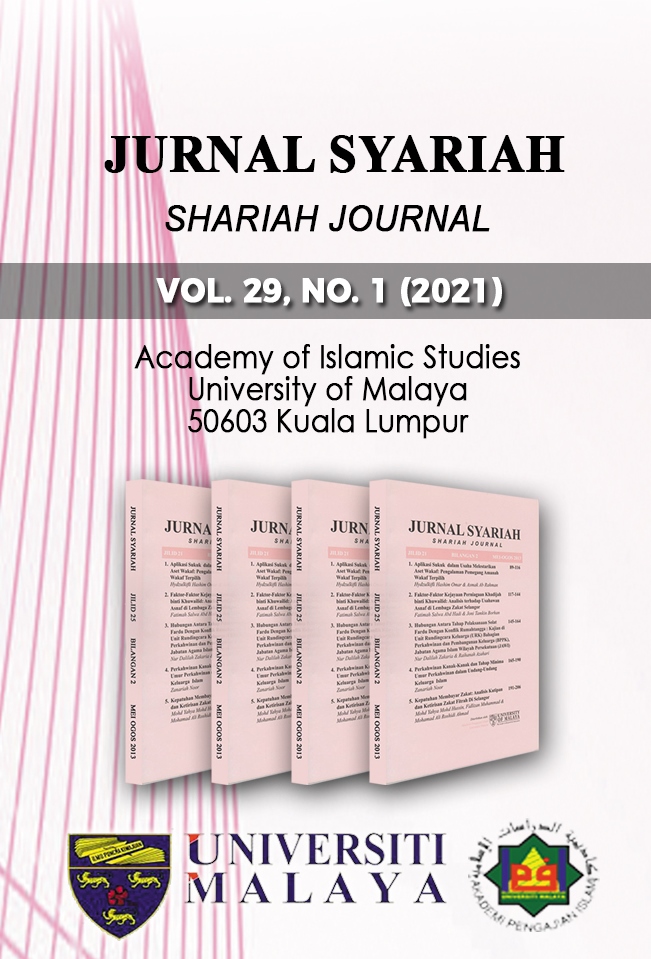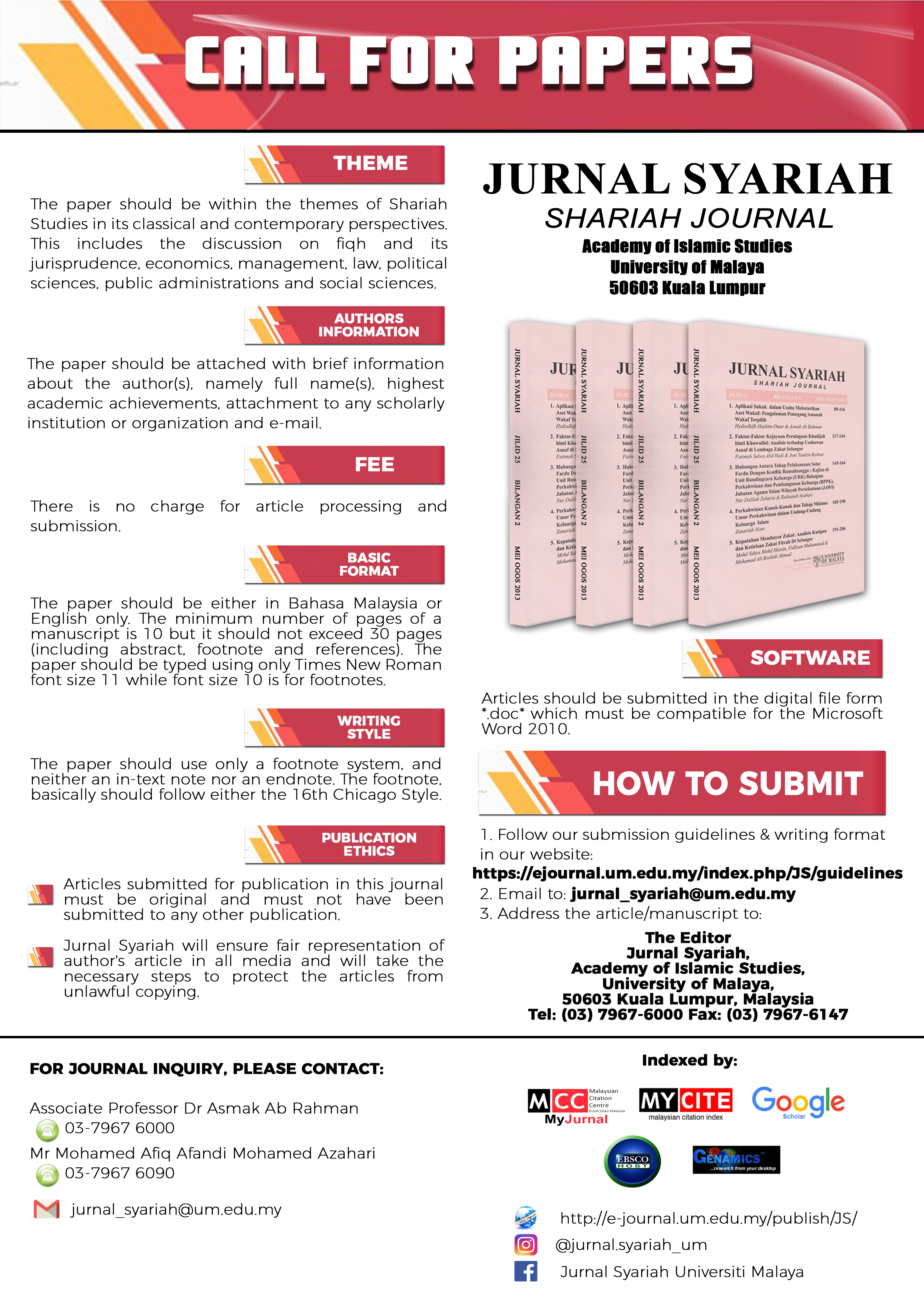NUSHŪZ AS A CAUSE OF DOMESTIC VIOLENCE IN NIGERIA: THE QUR’ANIC PROVISION FOR PEACEFUL FAMILY LIFE AND THE ROLE OF MUSLIM WOMAN IN THE PROCESS
DOI:
https://doi.org/10.22452/js.vol29no1.3Keywords:
nushūz, domestic violence, dispute resolution, husband, wifeAbstract
One of the common social problems in Nigerian society nowadays is the increasing of violence against women and children, mostly by male members of a family. Unfortunately, the problem has assumed a new dimension in recent times as husbands become victims of their wives leading violence against them. Throughout the history of human existence on earth. The Qur’ān identifies nushūz as a factor that leads to family crises in marriage contracts and steps have been recommended for peaceful resolution of such disputes in the Qur’ān. However, in spite of this provision, violence against family members is on increase among Muslim families in Nigeria. Some of the questions that many will ask are whether Muslim couples are aware of the Qur’anic guidance in resolving family crises or not? To what extent do the Muslims follow the Islamic teachings in matters related to family life before, during and after disputes? How can such increasing violence be controlled following the teachings of the Qur’ān and Sunnah of the Prophet SAW? What shall be the role of Muslim women in promoting peaceful life within the family? The paper is an attempt to answer the above questions and recommend the best ways to improve family life among Muslims. This will be through analytical studies of relevant texts of the Qur’ān and Sunnah and the current realities in Nigerian Muslim families with a particular reference to Gombe metropolitan city of Gombe State, Nigeria. The paper recommends that Islamic values should be emphasized and upheld at all levels of family life by all and sundry.
Downloads
References
Alison Rutherford, Anthony B. Zwi, Natalie J. Grove & Alexander Butchart J., ‘Violence: A Glossary,’ Epidemiol Community Health, vol. 61 (2007): 676-680.
Ananymous, ‘Half of Nigeria’s Women Experience Domestic Violence,’ AfrolNews http://www.afro.com/awrticles/16471.
Al-Bukhārī, Abī ‘Abd Allāh Muḥammad Ibn Ismā‘il al-Ju‘fī, al-Jāmi‘ al-Ṣaḥīḥ (Bayrūt: Dār Ibn Kathīr, 1987).
Ibn Kathīr, Abū Fidā’ Ismā‘il Ibn ‘Umar, al-Qurshī al-Damashqī, Tafsīr al-Qur’ān al-‘Aẓīm, vol. 1 (Qāhirah: Dār al-Taybah, 1999).
Al-Jassas, Aḥmad Ibn ‘Alī Abū Bakr, Aḥkām al-Qur’ān, vol. 2 (Bayrūt: Dār Iḥyā’ al-Turāth al-‘Arabī, 1405AH).
Mawlana Muftī Shāfi‘, Ma‘rīf al-Qur’ān, vol. 2 (Karashi: Dār al-‘Ulūm, 1995).
Muslim, Abī al-Ḥusayn Muslim Ibn al-Ḥajjāj Ibn al-Qushayrī al-Naysabūrī, Ṣaḥīḥ Muslim (Bayrūt: Dār al-Jiyl, n.d.).
Oyediran KA, Isiugo-Abanihe U., ‘Perceptions of Nigerian Women on Domestic Violence: Evidence from 2003 Nigeria Demographic and Health Survey,’ Afr J Reprod Health, vol. 9/2 (2005): 38-53.
Sambo, Abubakar, ‘The Practice of Polygamy Among Muslims in Gombe Metropolis: Problems and Solution,’ (Masters Dissertation, Department of Islamic Studies and Shariah, Bayero University, Kano, Nigeria, 2018).
Al-Tirmidhī, Abū ‘Īsā Muḥammad Ibn ‘Īsā Ibn Sawrah Ibn Mūsā, Sunan al-Tirmidhī, vol. 5 (Bayrūt: Dār Iḥyā’ al-Turāth al-‘Arabī, n.d.).
Downloads
Published
How to Cite
Issue
Section
License

This work is licensed under a Creative Commons Attribution-NonCommercial 4.0 International License.
COPYRIGHT: All rights reserved. Not allowed to be reproduced any part of articles and contents of this journal in any form or by any way, whether electronic, mechanical, photocopying, recording or otherwise without permission in writing from the Chief Editor, Jurnal Syariah.



















